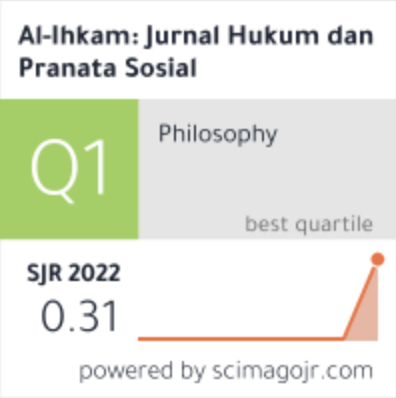THE POLITICAL SCRIMMAGE OF THE RELIGIOUS COURT’S LAW AS THE JUDICIAL INSTITUTION IN THE REFORMATION ERA IN INDONESIA
 Abstract views: 290
,
Abstract views: 290
,
 PDF downloads: 193
PDF downloads: 193
Abstract
Abstract:
Religious court as one of the four court environments is a special court for Moslems with its special authority scope also, either about its matter or its justice seekers (justiciabel). During twice of law changing in the reformation era, the court authority in the religious court’s environment is widened, this is suitable with the law development and the society’s need of law, especially Moslems. Although it has been ten years that the law of religious court is legitimated (2006-2016) but there are still problems in the authority of the religious court in the reformation era, some of them are the material law factor, where there has been no material laws and specific judicial procedure in the religious court environment. The factor of law politic of the Supreme Court (MA) as the highest institution should have given more attention to religious courts by synchronize the law regulation about special authority had by the religious court, and the third factor is cultural law in society which waits for the professionalism and integrity of the religious court in taking the new responsibility mainly in solving the Islamic economy dispute
Abstrak:
Peradilan agama sebagai salah satu dari empat lingkungan peradilan, merupakan lembaga peradilan khusus yang ditujukan kepada umat Muslim dengan lingkup kewenangan yang khusus pula, baik mengenai perkaranya maupun para pencari keadilannya (justiciabel). Dalam dua kali perubahan undang-undang di era reformasi, kewenangan pengadilan di lingkungan peradilan agama semakin diperluas, hal ini sesuai dengan perkembangan hukum dan kebutuhan hukum masyarakat, khususnya masyarakat Muslim. Walaupun sudah sepuluh tahun undang-undang peradilan agama disahkan (2006– 2016), namun problematika kewenangan Pengadilan Agama di era reformasi masih saja ada di antaranya adalah faktor materi hukum belum ada hukum materiil dan acara khusus di lingkungan pengadilan agama, Faktor politik hukum Mahkamah Agung sebagai lembaga tertinggi semestinya memberikan perhatian yang lebih kepada peradilan agama yaitu dengan melakukan singkronisasi peraturan perundangan-undangan mengenai kewenangan khusus yang dimiliki peradilan agama, dan faktor ketiga budaya hukum masyarakat menunggu profesionalitas dan integritas lembaga peradilan agama dalam mengembangan amanah kewenangan baru utamanya dalam penyelesaian sengketa ekonomi Islam.
Downloads
References
Afdol, Legislasi Hukum Islam di Indonesia, Surabaya: Airlangga University Press, 2006.
Anshori, Abdul Ghofur. Peradilan Agama di Indonesia Pasca UU No. 3 Tahun 2006: Sejarah, kedudukan dan Kewenangan. Yogyakarta: UII Press, 2007.
Assiddiqie, Jimly. Agenda Pembangunan Nasional di Abad Globalisasi. Jakarta: Balai Pustaka, 1988.
Atmasasmita, Romli. Reformasi Hukum: Hak Asasi Manusia, dan Penegakan Hukum. Bandung: Mandar Maju, 2001.
Blue Print of the Renewal of Supreme Court of Indonesia of 2003.
Budiardjo, Miriam. Budiardjo, Dasar-dasar Ilmu Politik. Jakarta: Gramedia, 1987.
Daud Ali, Mohammad and Daud, Habibah. Lembaga-lembaga Islam di Indonesia. Jakarta: RajaGrafindo Persada, 1995.
Harahap, M Yahya, Beberapa Tinjauan tentang Permasalahan Hukum, Bandung: Citra Aditya Bakti, 2004.
Manan, Bagir. Kekuasaan Kehakiman Indonesia dalam UU No. 4 Tahun 2004. Yogyakarta: FH UII Press, 2007.
Mardani. Hukum Acara Perdata Peradilan Agama. Jakarta: Sinar Grafika 2007.
Mujahidin, Ahmad. Peradilan Satu Atap di Indonesia. Bandung: Refika Aditama, 2007.
Seidman, Robert B. Seidman, The State Law and Development. New York: St. Martin’s Press, 1978.
Waluyo, Bambang. Waluyo, Implementasi Kekuasaan kehakiman Republik Indonesia.Jakarta: Sinar Grafika, 1992.
In order to be accepted and published by Al-Ihkam: Jurnal Hukum dan Pranata Sosial, author(s) submitting the article manuscript should complete all the review stages. By submitting the manuscript, the author(s) agreed to the following terms:
- The copyright of received articles shall be assigned to Al-Ihkam: Jurnal Hukum dan Pranata Sosial as the publisher of the journal. The intended copyright includes the right to publish articles in various forms (including reprints). Al-Ihkam: Jurnal Hukum dan Pranata Sosial maintain the publishing rights to the published articles.
- Authors are permitted to disseminate published articles by sharing the link/DOI of the article at Al-Ihkam: Jurnal Hukum dan Pranata Sosial. Authors are allowed to use their articles for any legal purposes deemed necessary without written permission from Al-Ihkam: Jurnal Hukum dan Pranata Sosial with an acknowledgment of initial publication to this journal.
- Users/public use of this website will be licensed to CC-BY-SA.



.png)
_1.png)










